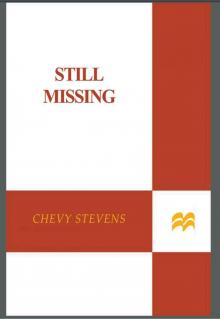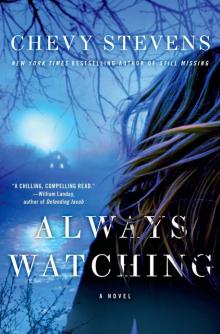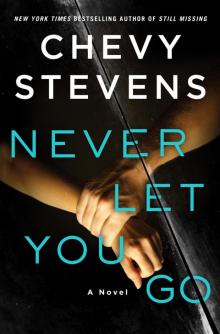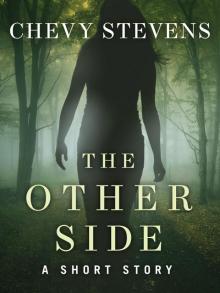- Home
- Chevy Stevens
Always Watching Page 2
Always Watching Read online
Page 2
I gave him an encouraging nod.
He continued. “She’d just gone through a breakup—her ex was a real jerk. But we started hiking and doing yoga together. It seemed to cheer her up.”
It had been a good idea on his part. Exercise is one of the best natural aids for depression.
“So you noticed some signs of depression before you got married?”
“I guess.… She’s the kind of person who’s always trying to take care of everyone else, so it’s hard to tell sometimes. She’d get really quiet or start crying, but she wouldn’t want to worry me, so I wouldn’t know what she was upset about. But when she got pregnant, she was really happy about the baby, picking out names, buying toys.…” His voice wavered. “I don’t know what to do about the baby’s room or all the clothes she bought.”
My mind flashed to Paul painting Lisa’s nursery strawberry red with apple green stripes because our child would be different, would skip to her own beat. Which she had, always—a trait I’d admired, until she danced away from me.
“Let’s take it one day at a time,” I said, as much to myself as to him. “You can work all that out later.”
“When can Heather come home?”
“She’s been involuntarily admitted into the hospital so we can keep an eye on her. We can’t release her until she’s no longer a danger to herself.”
“What if she tries … you know.” He swallowed hard. “What if she tries to do it again?”
“We won’t let her here. And we won’t send her home until she’s stable and has a good support system in place.”
“Can I see her? I brought some of her things.”
Normally, we’re strict about visiting hours—they’re only from four to nine in PIC, where everyone has to be buzzed in and out. We don’t allow visitors before noon, so patients can attend programs, and we can make our rounds. But he looked desperate, and I thought seeing him might help Heather settle in.
“She’s resting right now, but you can say a quick hello.”
* * *
We didn’t talk as we rode up the elevator to Psychiatric Intensive Care on the next floor. Daniel seemed lost in thought, and I was busy counting my heartbeats while focusing on my breathing. I’ve suffered from claustrophobia for years, a fact that would probably shock my patients. Various coping techniques help, from mental imagery to breathing exercises, but when I first heard the elevator seal shut, I had to restrain myself from hitting the panic button.
We were buzzed into the unit. In PIC, the nurses’ station is behind glass, and a security guard is always at hand. One side of the unit is for high-risk patients like Heather, and the other is the step down unit, where they go when they don’t need the same level of monitoring. If they continue to improve, they are moved down to the next floor, where they have more freedom.
The nurse searched the bag Daniel had brought for Heather to make sure there wasn’t anything she could hurt herself with—the frame was removed from their wedding photograph, same with the tie from her robe. When the nurse was finished, I showed Daniel to an alcove in the lounge area, where they could have some privacy but still be in view, then went to get Heather.
As I entered the seclusion room, I gave her a quick visual. She was still curled in a ball, her pale arms wrapped around her torso with both small hands on her shoulders, as if she were trying to hold herself together.
“Heather, do you feel up to a visit with Daniel now?”
Heather twitched at the sound, then slowly rolled over. Her voice was pleading, and her eyes flooded with tears, as she said, “I need to see him.”
“Okay, but you’ll have to come out with me because we don’t allow visitors in the seclusion rooms. Are you feeling strong enough to stand?”
She was already pulling herself up into a sitting position.
* * *
When we entered the lounge area, Daniel jumped to his feet—and froze as he took in the sight of his wife slowly shuffling beside me, the bandages on her wrists, the hospital blue pajamas, the blanket she’d wrapped around her shoulders like an old woman’s shawl.
“Daniel!” she cried out.
“Oh, sweetie,” he said as he gathered her into her arms. “You can’t scare me like that again.”
Once a patient has been in for a few days we leave them alone with their visitors, but I wanted to see how Daniel and Heather interacted—in case Daniel was part of the problem. I sat in one of the chairs a little to the side.
Daniel gently helped Heather lower herself before taking a seat. Heather rested her head against his shoulder, and he wrapped his arm around her back, supporting her.
“I’m sorry, Daniel.” Heather’s voice was raw with emotion. “I hate what I’m doing to you. You shouldn’t have to take care of me all the time.”
A red flag. Suicidal patients try to convince themselves that people would be better off without them.
Daniel said, “Don’t talk like that. I love you. I’m not going anywhere. I’m going to take care of you forever.” As though to prove his point, he pulled the blanket up around her shoulders, tucking it around her neck where the hospital pajamas had drifted down, revealing the hollow of her thin collarbone.
She clearly wasn’t frightened of Daniel, so I decided to leave and finish my rounds. Then Heather, speaking slightly under her breath, said something that caught my attention.
“I told the doctor about how they keep calling.”
“What did you say?” Daniel didn’t sound upset, just a little worried.
“Not much, I don’t think.… I’m confused, and my head feels funny. Are you mad at me?”
“I’m not mad, sweetie. But maybe you shouldn’t think about any of that right now, just think about getting better. We can talk about everything else another day.” His face was earnest, making sure she understood.
“Do you think Emily knows … what I did?”
“No, they probably wouldn’t have told her at the center.”
Heather nodded, then glanced up at the camera in the corner. She’d also glanced at it when she first sat down, and I wondered if she’d been at a treatment center where patients were monitored.
“Is there someone you’d like me to contact for you?” I said.
Heather looked at Daniel. He shook his head, just a slight movement, but she nodded back, acquiescing to whatever he’d just silenced.
I said, “It would help my treatment plan for Heather if you told me what program you were attending.”
Heather rested her hand on Daniel’s leg, her eyes pleading with him. Daniel’s were focused on her bandages, then he turned to me.
“We used to live at a spiritual center. It’s out in Jordan River. We left when Heather got pregnant because she didn’t want to have the baby there. Some of the members have been calling to make sure we’re okay. They’re nice people.”
I’d heard that there was a center out in Jordan River, a spiritual retreat of sorts that was well respected, but I didn’t know much else about them.
Heather had started to cry again, her shoulders shaking.
“They made me feel like it was my fault I lost the baby.”
“They don’t really believe it’s your fault—no one thinks that,” Daniel said. “They’re just trying to help, sweetie. You were doing so well.”
Heather was crying harder now, her face twisted.
“I didn’t like how they’re always telling us what to do. They—”
“Heather, stop—you don’t know what you’re saying.” Daniel’s eyes shot to my face, his voice concerned and his expression helpless. “They have rules, Dr. Lavoie, but they’re so we can stay focused on the workshops.”
Heather and Daniel clearly weren’t on the same page about the center, but she didn’t want to contradict Daniel in front of me. She kept glancing at him. Is it okay that I’m saying this? Do you still love me?
She gazed at him now, her hands gripping her blanket tight around her.
“They wouldn’t l
et me say good-bye to Emily.”
This was the second time Heather had mentioned Emily.
“Emily didn’t want to leave with us, remember? She loves it at the center. I know you miss her, but you need to worry about yourself and the bab—”
Heather recoiled like he’d hit her.
Daniel said, “Oh, sweetie, I’m sorry. It was just habit.”
Heather’s eyes had gone dark and empty again, her hands dropped by her sides, palms up—defeated.
“It’s my fault I lost the baby. You’re mad at me.”
“It’s not your fault, Heather—and I’m not mad at you.” In a voice so loving and sad it made my heart hurt, he added, “You’re the most important thing in the world to me.”
“They said we should stay. They said it was better for our baby—and maybe they were right. I made you leave, and now the baby’s dead.”
“Heather, stop.” Daniel was rubbing her back. “Don’t say things like that.” He put his face close to hers. “Hey, look at me.” But Heather was just staring at the wall now, her expression blank.
I didn’t want to push things too much, especially with Heather starting to dissociate from the conversation, but I was concerned about why she was blaming herself so much for the loss of her baby.
“Why did you want to leave the center, Heather?”
She began to rock, her arms wrapped around her body.
“They said that all adults are the child’s parents. So everyone helps raise them, and they don’t even stay with you.”
The horror in her face made it clear that this hadn’t sat well with her.
“At the center, they believe it’s better for the baby’s spiritual growth to be loved by many hearts,” Daniel said. “They have highly trained caregivers.”
This center sounded highly controlling. I turned to Heather.
“But you didn’t want to share your child?”
She nodded and glanced at Daniel, who stared down at Heather’s bandages again. She looked like she wanted to explain herself more, but then she reached out and held Daniel’s hand. He gave it a small squeeze.
“I think I was wrong, though,” she said. “We should’ve stayed. Then I wouldn’t have miscarried.”
I said, “How can you know that you wouldn’t have miscarried even if you had stayed? Did they actually tell you that you were responsible?”
“They didn’t say it was our fault,” Daniel said. “They were just worried that Heather had gotten herself too stressed out by moving.”
In other words, they had implied that it was her fault.
“What is this center called?” I said.
Daniel sat straighter, his shoulders proud.
“The River of Life Spiritual Center.”
Something tickled at the back of my mind, followed by an uncomfortable feeling of dread settling in my stomach.
“Who runs it?”
“Aaron Quinn. He’s the director of all the programs at the center.”
Aaron Quinn. He said Aaron Quinn.
It couldn’t be the same man.
Heather’s voice was a whisper. “Most of the members call it the commune.”
The commune. I hadn’t heard that name in years. I hadn’t wanted to hear it ever again. I stared at Heather, trying to think, my heart thudding in my ears.
“Dr. Lavoie?” Heather’s blue eyes were full of sorrow and pain. “Do you think it’s my fault the baby died?”
It took a second for me to refocus my thoughts. You have a patient, and she needs your help.
“No, I don’t think it’s your fault. You made a decision you thought was best for your child—you were just being good parents.” I talked on for a minute or two, heard the comforting words coming out of my mouth. But all the while my head was filled with a dull roar, the sound of fate and life colliding. Because what I couldn’t tell them was that I knew Aaron Quinn.
I knew exactly who he was.
CHAPTER TWO
When I was twenty-five, I’d decided to go back to school and was attending the University of Victoria for a degree in science. I’d learned ways to deal with tight hallways and stairwells, mostly by avoiding them, but during final exams, all the outside lots were full and I’d been forced to park underground. I’d been overwhelmed by panic in the dark space and hadn’t been able to step into the elevator. I had to walk the long way around, while hyperventilating in big gasps of air, my hair soaked with sweat, earning me stares from every student I passed. I’d missed the beginning of my exam and the door was closed, so I failed the course. It had been a humiliating experience, and I began therapy soon after.
While discussing my childhood with the therapist, I shared that my mother had run away with my brother and me to a commune when I was thirteen. The commune, led by a man named Aaron Quinn, had been built beside the Koksilah River on the outskirts of Shawnigan Lake, which is a small community about thirty minutes north of Victoria—on the southern tip of Vancouver Island. We lived there for eight months until my father came to get us.
My therapist had found this period in my life fascinating and wanted to explore it further. Especially because I’d been unable to pinpoint when my claustrophobia had developed, but I had more distinct memories of it interfering with my life after we’d moved back home. I slept with a night-light and my door open—I couldn’t even clean the barn without hyperventilating, and Robbie, my brother, had to take over the chore for me.
Believing that my claustrophobia was linked to suppressed trauma, from something that had happened while at the commune, my therapist had suggested we try hypnosis as a way to unlock my memories. Recovered Memory Therapy was a popular treatment at the time, and he felt it was the best way to recover any lost memories. I’d been hesitant at first—I had enough painful memories already.
My family life hadn’t been easy growing up. My father, a strict German, was hard to please but easy to anger. His temper often turned violent, and we spent much of our childhood hiding while he was on a drunken rampage, smashing his huge fists into the windows or knocking our mother around. If we intervened, she’d just scream that we were making it worse. He worked on a fishing boat, and my mother, who was unbalanced when he was around, became downright dangerous when he was away. She was either on top of the world, buying us gifts we couldn’t afford and taking us on trips all over the island, or shut in her room for days, the curtains pulled down and the door locked. She’d often threaten to kill herself, the pills in her hands as we pleaded with her until she finally handed them over. Other times she’d take off in the truck, drunk or high on medication, not returning until the morning. Now I would diagnose her as manic-depressive, but back then all we knew was that my mother’s moods were a slippery slope and we never knew where she would land.
The only person I could depend on was Robbie, my older brother by three years, whom I followed everywhere. He was my first best friend, my only friend growing up on a ranch where all our school friends lived miles away. Though we were very different, me with my love of books and school, he with mechanics and carpentry, we’d spend hours in the woods, building forts and playing army. Robbie wanted to join the army as soon as he turned eighteen, but I secretly hoped he’d change his mind. I didn’t know how I would survive without him.
One February, just before I turned thirteen, my father was away on the boats, and we were at the local corner store with my mom. Robbie was waiting in the truck. Mom was in one of her down phases, which meant she’d barely eaten for days—neither had we—and she was listlessly picking up items: Kraft Dinner, tomato soup, bread, peanut butter, wieners, hot dog buns, cereal. Her hair, normally a glossy, shiny black, was dull and limp. Mom’s hair started going gray in her thirties, though she never lived long enough for it to turn completely silver. When I also started going gray young, I dyed my hair for years, wondering sometimes if it was more out of fear of becoming my mother than vanity.
That day there were a couple of young men in the store, wearing faded bell-bo
ttoms and loose, caftan-styled shirts, ponchos for coats, strange knit toques, their hair almost as long as my mother’s. Back then, in the late sixties, it was common to see hippies in town, but I still thought them fascinating. I flipped through some magazines at the counter while I watched my mom talking to the earnest young men. I was used to men paying attention to my mother, with her pale blue eyes and long dark hair, her body slim from working on the ranch; she always attracted attention, but something seemed different about the tone of this conversation. Though it was cold out, the men were wearing sandals, and I couldn’t stop looking at their feet.
I don’t know what they had said to my mom, but by the time we drove home, she had switched to her up phase. Laughing as she careened around corners, her eyes too bright, teasing us kids, who were terrified, for being “scaredy-cats.” Robbie tried not to show his fear, but his knuckles were white as he gripped the truck door, his other arm around my shoulders, holding me in place. It wasn’t the first time she’d taken us on one of her wild rides.
Years later, when I was twenty-six, my mother was killed in an accident. She’d slid on wet roads and lost control, hitting a tree doing a hundred. But I’d read the report, there were no skid marks: She never tried to slow down. She wasn’t trying now either.
When we finally made it home, Robbie climbed out, and I slithered after him on wobbly legs. Mom had already leaped out, slamming the door behind her. We followed her into the house, a small rancher with cedar-shake siding, a sloping floor, and so many leaks we had buckets all over the house when it rained. Mom was in her bedroom, throwing clothes into a suitcase.
Robbie said, “Mom, what are you doing?”
“We’re getting out of here. Grab your things.”
Robbie said, “Are we going on a trip?”
“Pack everything—we’re not coming back.”
Robbie’s face was scared. “We can’t just leave Dad—”
She stopped and turned to us. “He leaves us alone for months—I can’t live like this anymore. We’re going to stay with some people out by the river.”
A kaleidoscope of confusing thoughts spun through my mind. Was she going to divorce our dad? What people? Did she mean the hippies we’d met?

 Still Missing
Still Missing Always Watching
Always Watching Those Girls
Those Girls Never Knowing
Never Knowing Never Let You Go
Never Let You Go That Night
That Night The Other Side
The Other Side Dark Roads
Dark Roads